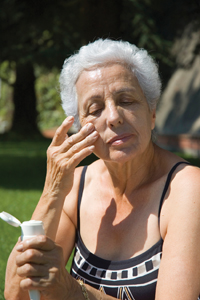
Aging skin
When it comes to our skin, many of us are more concerned with wrinkles, sun spots (also called liver spots), and other signs of aging than skin cancer. But skin cancer is a serious concern. It is the most common form of cancer in the United States. Research indicates that 40 to 50 percent of Americans who live to age 65 will have skin cancer at least once. Luckily, it's easy to manage concerns about signs of aging and skin cancer at the same time. The best way to prevent signs of aging is also the best way to prevent skin cancer: Protect yourself from the sun.
But what about promises of instant youth in a jar? Experts say that over-the-counter creams and lotions can help ease dry skin — which is more common as you age — but they can't turn back time.
Prescription creams, chemical peels, laser treatments, Botox, and other cosmetic procedures are being used to treat sun spots, wrinkles, and other signs of aging. But results vary and some treatments remain unproven. These treatments also don't prevent further damage. So for now, to ward off future signs of aging and lower your risk of skin cancer:
- Avoid the sun when its rays are strongest — between 10 a.m. and 3 p.m.
- Use sunscreen that has a high SPF number (15 or higher). It should also protect your skin from both UVA and UVB rays. Experts recommend using sunscreen daily, year-round — especially on your face.
- If you're out in the sun for a long time, protect your ears and scalp with a hat. For extra body protection, wear lightweight long-sleeved shirts and pants.
Checking your skin regularly is a good idea. Tell your doctor right away about skin changes, such as new growths, sores that don't heal, or changes in the size, shape, color, or feel of an existing mole. Skin changes are not always cancer. But you should have a doctor check out a skin change to be sure. Many types of skin cancer can be cured if found and treated early.
More information on aging skin
Read more from womenshealth.gov
-
Varicose Veins and Spider Veins Fact Sheet — This fact sheet provides information about varicose and spider veins, including the causes, prevention, potential dangers, and treatment.
http://www.womenshealth.gov/publications/our-publications/fact-sheet/varicose-spider-veins.cfm
Explore other publications and websites
-
Basic Information About Skin Cancer — This fact sheet briefly describes the major types of skin cancer and who is at risk.
http://www.cdc.gov/cancer/skin/basic_info/
-
Melanoma Treatment (PDQ®) — This publication contains information about melanoma (skin cancer). It includes an explanation about the different stages and treatment options for patients with melanoma.
http://www.cancer.gov/cancertopics/pdq/treatment/melanoma/Patient
-
Skin Aging — Your skin changes as you age. You might notice wrinkles, age spots, and dryness. This site is a general source of information regarding aging skin.
http://www.nlm.nih.gov/medlineplus/skinaging.html
-
Skin Care and Aging — Americans spend a lot of money each year on skin care products that promise to erase wrinkles, lighten age spots, and eliminate itching, flaking, or redness. But the simplest and cheapest way to keep your skin healthy and young looking is to stay out of the sun. This article discusses ways in which the sun can damage your skin.
http://www.nia.nih.gov/HealthInformation/Publications/skin.htm
-
What You Need To Know About Skin Cancer — This booklet focuses on non-melanoma skin cancer. It discusses risk factors for skin cancer and ways to reduce risk. It also provides an overview of symptoms, diagnosis, treatment, and questions to ask the doctor.
http://www.cancer.gov/cancertopics/wyntk/skin
Connect with other organizations
-
American Academy of Dermatology
http://www.aad.org/
-
National Institute on Aging Information Center, NIA, NIH, HHS
http://www.nia.nih.gov/
-
National Institute on Aging, NIH, HHS
http://www.nia.nih.gov/
Content last updated August 12, 2010.
Resources last updated August 12, 2010.
womenshealth.gov
A federal government website managed by the Office on Women's Health in the Office of the Assistant Secretary for Health at the U.S. Department of Health and Human Services.
200 Independence Avenue, S.W. • Washington, DC 20201


 Text size
Text size Email
Email
